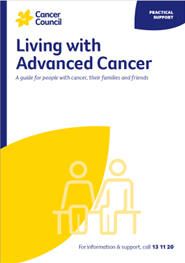- Home
- Prostate cancer
- Advanced prostate cancer
Advanced prostate cancer
If prostate cancer has spread (metastasised) to other parts of the body, you may have a combination of drug therapies, external beam radiation therapy (EBRT), androgen deprivation therapy (ADT) or chemotherapy.
Learn more about:
- Drug therapies
- Radiation therapy
- Chemotherapy
- Transurethral resection of the prostate (TURP)
- Bone therapies
- Palliative treatment
- Podcast: Treatment Options for Advanced Cancer
Drug therapies
Newer drug therapies may be used to treat advanced prostate cancer that has come back while having ADT. These drugs (e.g. abiraterone, apalutamide, darolutamide, enzalutamide) are often hormone therapy tablets that can be combined with ADT to help control the cancer and reduce symptoms. They are usually taken daily.
These new drugs are available through the PBS for advanced prostate cancer. Treatment usually aims to relieve symptoms or keep the cancer under control for years. Hormone-sensitive prostate cancer may be treated with ADT alongside other treatments outlined below. Using drug therapies, chemotherapy and hormone therapies together is often called triple therapy.
Other drug therapies include drugs that target specific features of cancer cells, called targeted therapy. These drugs (e.g. olaparib) are used for cancer with gene changes (such as BRCA) linked to prostate cancer.
For more on this, see Targeted therapy and listen to our podcast on New Cancer Treatments.
Radiation therapy
You may be offered radiation therapy to slow the growth of the cancer. Radiation therapy may be given to the areas where the cancer has spread, such as the lymph nodes or bones (see Bone therapies). You may also have radiation therapy to the prostate if you have not previously had any radiation treatment.
Chemotherapy
Chemotherapy uses drugs to kill cancer cells or slow their growth. If the prostate cancer continues to spread despite using ADT and other drug therapies, chemotherapy may be suitable. Chemotherapy may also be offered as part of initial treatment in combination with ADT.
Generally, chemotherapy is given through a drip (infusion) into a vein (intravenously). For prostate cancer, chemotherapy is usually given once every 3 weeks for 4–6 months and you do not stay in hospital.
Side effects of chemotherapy may include fatigue, hair loss, changes in blood counts increasing the risk of bleeding or infections, numbness or tingling in the hands or feet (peripheral neuropathy), changes in nails, watery eyes and runny nose, and rare side effects, such as allergic reactions or blocked tear ducts.
For more on this, see Chemotherapy.
Transurethral resection of the prostate (TURP)
This surgical procedure is used to treat problems passing urine. It helps with symptoms of more advanced prostate cancer, such as the need to pass urine more often and a slow flow of urine.
If you have localised cancer, TURP may be used before radiation therapy to relieve symptoms of urinary blockage. TURP is also used to treat benign prostate hyperplasia.
You will be given a general or spinal anaesthetic. A narrow tube-like instrument is passed through the opening of the penis and up the urethra to remove the blockage. The surgery takes about an hour, and you will usually stay in hospital for a couple of days. Side effects may include blood in urine or problems urinating for a few days.
Bone therapies
If the prostate cancer has spread to the bones (bone metastases), your doctor may suggest treatments to manage the effect on the bones. Drugs can be used to prevent or minimise bone pain and reduce the risk of fractures and pressure on the spinal cord.
Radiation therapy can also be used to control bone pain, to prevent fractures or help them heal, and to treat pressure on spinal nerves (spinal cord compression) from cancer that has spread to the spine.
→ READ MORE: Palliative treatment for prostate cancer
Podcast: Treatment Options for Advanced Cancer
Listen to more of our podcast for people affected by advanced cancer
More resources
Prof Declan Murphy, Consultant Urologist, Director – Genitourinary Oncology, Peter MacCallum Cancer Centre and The University of Melbourne, VIC; Alan Barlee, Consumer; Dr Patrick Bowden, Radiation Oncologist, Epworth Hospital, Richmond, VIC; Bob Carnaby, Consumer; Dr Megan Crumbaker, Medical Oncologist, St Vincent’s Hospital Sydney, NSW; Henry McGregor, Health Physiotherapist, Adelaide Men’s Health Physio, SA; Jessica Medd, Senior Clinical Psychologist, Department of Urology, Concord Repatriation General Hospital and Headway Health, NSW; Dr Gary Morrison, Shine a Light (LGBTQIA+ Cancer Support Group); Caitriona Nienaber, 13 11 20 Consultant, Cancer Council WA; Graham Rees, Consumer; Kerry Santoro, Prostate Cancer Specialist Nurse Consultant, Southern Adelaide Local Health Network, SA; Prof Phillip Stricker, Chairman, Department of Urology, St Vincent’s Private Hospital, NSW; Dr Sylvia van Dyk, Brachytherapy Lead, Peter MacCallum Cancer Centre, VIC.
View the Cancer Council NSW editorial policy.
View all publications or call 13 11 20 for free printed copies.

